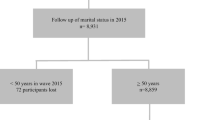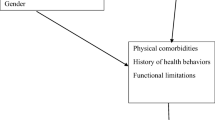Abstract
Research on marital status-gender differences in later-life trajectories of cognitive functioning is scarce. Drawing on seven waves of data from the Hispanic Established Population for the Epidemiologic Study of the Elderly, this research uses growth curve models to examine later-life dynamics of cognitive functioning among married and widowed older men and women of Mexican descent (aged 65+; N = 3329). The findings demonstrate that the widowed, regardless of gender, had lower initial levels of cognition but a less steep cognitive decline across waves, compared to married men. Age and socioeconomic resources accounted for these marital status differences in levels and rates of change in cognitive functioning completely among widowed men and partially among widowed women. Moreover, net of all the factors, married women had a slower cognitive decline than married men. This study also shows that health and social integration might shape cognitive functioning among older adults of Mexican descent.
Similar content being viewed by others
References
Aartsen, M. J., van Tilburg, T., Smith, C. H. M., Comijs, H. C., & Knipscheer, K. C. P. M. (2005). Does widowhood affect memory performance of older people? Psychological Medicine, 35, 217–226.
Adams, B., Aranda, M. P., Kemp, B., & Takagi, K. (2002). Ethnic and gender differences in distress among Anglo American, African American, Japanese American, and Mexican American spousal caregivers of persons with dementia. Journal of Clinical Geropsychology, 8, 279–301.
Angel, J. L., Douglas, N., & Angel, R. J. (2003). Gender, widowhood, and long-term care in the older Mexican American population. Journal of Women & Aging, 15, 89–105.
Arber, S. (2004). Gender, marital status, and ageing: Linking material, health, and social resources. Journal of Aging Studies, 18, 91–108.
Atti, A. R., Forlani, C., De Ronchi, D., Palmer, K., Casadio, P., Dalmonte, E., & Fratiglioni, L. (2010). Cognitive impairment after age 60: Clinical and social correlates in the “Faenza Project”. Journal of Alzheimer’s Disease, 21, 1325–1334.
Benn, E. K. T., Fox, A., Fei, K., Roberts, E., & Boden-Albala, B. (2015). Moving towards a more comprehensive investigation of racial/ethnic differences in cognitive disability among US adults. Journal of Immigrant and Minority Health, 17, 1105–1113.
Bordone, V., & Weber, D. (2012). Number of children and cognitive abilities in later life. Vienna Yearbook of Population Research, 10, 95–126.
Brenowitz, W. D., Kukull, W. A., Beresford, S. A. A., Monsell, S. E., & Williams, E. C. (2014). Social relationships and risk of incident mild cognitive impairment in U.S. Alzheimer’s disease centers. Alzheimer Disease and Associated Disorders, 28, 253–260.
Chiriboga, D. A., Black, S. A., Aranda, M., & Markides, K. (2002). Stress and depressive symptoms among Mexican American elders. Journal of Gerontology: Psychological Sciences, 57B, P559–P568.
Chodosh, J., Miller-Martinez, D., Aneshensel, C. S., Wight, R. G., & Karlamangla, A. S. (2010). Depressive symptoms, chronic diseases, and physical disabilities as predictors of cognitive functioning trajectories in older Americans. Journal of the American Geriatrics Society, 58, 2350–2357.
Comijs, H. C., van den Kommer, T. N., Minnaar, R. W. M., Penninx, B. W. J. H., & Deeg, D. J. H. (2011). Accumulated and differential effects of life events on cognitive decline in older persons: Depending on depression, baseline cognition, or ApoE ɛ4 status? The Journals of Gerontology. Series B: Psychological Sciences and Social Sciences, 66B(S1), i111–i120.
Corsentino, E., Collins, N., Sachs-Ericsson, N., & Blazer, D. (2009). Religious attendance reduces cognitive decline among older women with high levels of depressive symptoms. The Journals of Gerontology, Series A: Biological Sciences and Medical Sciences, 64, 1283–1289.
Díaz-Venegas, C., Downer, B., Langa, K. M., & Wong, R. (2016). Racial and ethnic differences in cognitive function among older adults in the USA. International Journal of Geriatric Psychiatry, 31, 1004–1012.
Feng, L., Ng, X.-T., Yap, P., Li, J., Lee, T.-S., Håkansson, K., Kua, E.-H., & Ng, T.-P. (2014). Marital status and cognitive impairment among community-dwelling Chinese older adults: The role of gender and social engagement. Dementia and Geriatric Cognitive Disorders Extra, 4, 375–384.
Folstein, M., Folstein, S., & McHugh, P. (1975). Mini-mental state: A practical method for grading the state of patients for the clinician. Journal of Psychiatric Research, 12, 189–198.
Foong, H. F., Hamid, T. A., Ibrahim, R., Haron, S. A., & Shahar, S. (2018). Predicting cognitive function of the Malaysian elderly: A structural equation modelling approach. Aging & Mental Health, 22, 109–120.
Fratiglioni, L., Wang, H.-X., Ericsson, K., Maytan, M., & Winblad, B. (2000). Influence of social network on occurrence of dementia. Lancet, 355, 1315–1319.
Garcia, M. A., Downer, B., Chiu, C.-T., Saenz, J. L., Rote, S., & Wong, R. (2017). Racial/ethnic and nativity differences in cognitive life expectancies among older adults in the United States. The Gerontologist, Advance Access Publication September, 16, 2017.
Gonzales, A. M. (2007). Determinants of parent-child coresidence among older Mexican parents: The salience of cultural values. Sociological Perspectives, 50, 561–577.
González, H., Ceballos, M., Tarraf, W., West, B., Bowen, M., & Vega, W. (2009). The health of older Mexican Americans in the long run. American Journal of Public Health, 99, 1879–1885.
Hanson, H. A., Horn, K. P., Rasmussen, K. M., Hoffman, J. M., & Smith, K. R. (2017). Is cancer protective for subsequent Alzheimer’s disease risk? Evidence from the Utah population database. Journals of Gerontology: Social Sciences, 72, 1032–1043.
Harada, C. N., Natelson Love, M. C., & Triebel, K. (2013). Normal cognitive aging. Clinics in Geriatric Medicine, 29, 737–752.
Hayward, M. D., Hummer, R. A., Chiu, C.-T., González-González, C., & Wong, R. (2014). Does the Hispanic paradox in U.S. adult mortality extend to disability? Population Research and Policy Review, 33, 81–96.
Helmer, C., Damon, D., Letenneur, L., Fabrigoule, C., Barberger-Gateau, P., Lafont, S., Fuhrer, R., Antonucci, T., Commenges, D., Orgogozo, J. M., & Dartigues, J. F. (1999). Marital status and risk of Alzheimer's disease: A French population-based cohort study. Neurology, 53, 1953–1958.
Herrera, A. P., Lee, J., Palos, G., & Torres-vigil, I. (2008). Cultural influences in the patterns of long-term care use among Mexican American family caregivers. Journal of Applied Gerontology, 27, 141–165.
Howrey, B. T., Raji, M. A., Masel, M. M., & Peek, M. K. (2015). Stability in cognitive function over 18 years: Prevalence and predictors among older Mexican Americans. Current Alzheimer Research, 12, 614–621.
Karlamangla, A. S., Miller-Martinez, D., Aneshensel, C. S., Seeman, T. E., Wight, R. G., & Chodosh, J. (2009). Trajectories of cognitive function in late life in the United States: Demographic and socioeconomic predictors. American Journal of Epidemiology, 170, 331–342.
Khondoker, M., Rafnsson, S. B., Morris, S., Orrell, M., & Steptoe, A. (2017). Positive and negative experiences of social support and risk of dementia in later life: An investigation using the English longitudinal study of ageing. Journal of Alzheimer’s Disease, 58, 99–108.
Langa, K. M., Llewellyn, D. J., Lang, I. A., Weir, D. R., Wallace, R. B., Kabeto, M. U., & Huppert, F. A. (2009). Cognitive health among older adults in the United States and in England. BMC Geriatrics, 9, 23. https://doi.org/10.1186/1471-2318-9-23.
Liao, J., & Scholes, S. (2017). Association of social support and cognitive aging modified by sex and relationship type: A prospective investigation in the English longitudinal study of ageing. American Journal of Epidemiology, 186, 787–795.
Markides, K. S., Stroup-Benham, C. A., Goodwin, J. S., Perkowski, L. C., Lichtenstein, M., & Ray, L. A. (1996). The effect of medical conditions on the functional limitations of Mexican-American elderly. Annals of Epidemiology, 6, 386–391.
Matthews, F., Marioni, R., & Brayne, C. (2012). Examining the influence of gender, education, social class and birth cohort on MMSE tracking over time: A population-based prospective cohort study. BMC Geriatrics, 12, 45.
Mazzuco, S., Meggiolaro, S., Ongaro, F., & Toffolutti, V. (2017). Living arrangement and cognitive decline among older people in Europe. Ageing & Society, 37, 1111–1133.
Mielke, M. M., Rosenberg, P. B., Tschanz, J., Cook, L., Corcoran, C., Hayden, K. M., Norton, M., Rabins, P. V., Green, R. C., Welsh-Bohmer, K. A., Breitner, J. C. S., Munger, R., & Lyketsos, C. G. (2007). Vascular factors predict rate of progression in Alzheimer disease. Neurology, 69, 1850–1858.
Moon, Y., Lee, H., NamGung, O.-K., & Han, S.-H. (2016). Which stratum of urban elderly is most vulnerable for dementia? Journal of Korean Medical Science, 31, 1635–1640.
Mungas, D., Marshall, S. C., Weldon, M., Haan, M., & Reed, B. R. (1996). Age and education correction of mini-mental state examination for English- and Spanish-speaking elderly. Neurology, 46, 700–706.
Nguyen, H. T., Black, S. A., Ray, L. A., Espino, D. V., & Markides, K. S. (2002). Predictors of decline in MMSE scores among older Mexican Americans. Journal of Gerontology: Medical Sciences, 57A, M181–M185.
Ortman, J. M., Velkoff, V. A., & Hogan, H. (2014). An aging nation: The older population in the United States. U.S. Census Bureau. Retrieved from https://www.census.gov/content/dam/Census/library/publications/2014/demo/p25-1140.pdf. Accessed 15 August 2018.
Poey, J. L., Burr, J. A., & Roberts, J. S. (2017). Social connectedness, perceived isolation, and dementia: Does the social environment moderate the relationship between genetic risk and cognitive well-being? The Gerontologist, 57, 1031–1040.
Radloff, L. S. (1977). The CES–D scale: A self-report depression scale for research in the general population. Applied Psychological Measurement, 1, 385–401.
Rodriguez, N., Mira, C. B., Paez, N. D., & Myers, H. F. (2007). Exploring the complexities of familism and acculturation: Central constructs for people of Mexican origin. American Journal of Community Psychology, 39, 61–77.
Rohlfsen, L. S., & Kronenfeld, J. J. (2014). Gender differences in functional health: Latent curve analysis assessing differential exposure. Journals of Gerontology, Series B: Psychological Sciences and Social Sciences, 69, 590–602.
Seeman, T. E., Lusignolo, T. M., Albert, M., & Berkman, L. (2001). Social relationships, social support, and patterns of cognitive aging in healthy, high-functioning older adults: MacArthur studies of successful aging. Health Psychology, 20, 243–255.
Sheffield, K. M., & Peek, M. K. (2009). Neighborhood context and cognitive decline in older Mexican Americans: Results from the Hispanic established populations for epidemiologic studies of the elderly. American Journal of Epidemiology, 169, 1092–1101.
Singer, J. D., & Willett, J. B. (2003). Applied longitudinal data analysis: Modeling change and event occurrence. New York: Oxford University Press.
Socal, M. P., & Trujillo, A. J. (2018). Links between chronic illness and late-life cognition: Evidence from four Latin American countries. Journal of Aging and Health, 30, 262–304.
Sommerlad, A., Ruegger, J., Singh-Manoux, A., Lewis, G., & Livingston, G. (2017). Marriage and risk of dementia: Systematic review and meta-analysis of observational studies. Journal of Neurology, Neurosurgery, and Psychiatry, 89, 1–8. https://doi.org/10.1136/jnnp-2017-316274.
Stott, D. J. (2006). Cognitive decline in ageing. Asian Journal of Gerontology & Geriatrics, 1, 21–25.
Sundström, A., Westerlund, O., & Kotyrlo, E. (2016). Marital status and risk of dementia: A nationwide population-based prospective study from Sweden. BMJ Open, 6, e008565. https://doi.org/10.1136/bmjopen-2015-008565.
Tilvis, R. S., Kähönen-Väre, M. H., Jolkkonen, J., Valvanne, J., Pitkala, K. H., & Strandberg, T. E. (2004). Predictors of cognitive decline and mortality of aged people over a 10-year period. Journal of Gerontology: Medical Sciences, 59, 268–274.
van Gelder, B. M., Tijhuis, M., Kalmijn, S., Giampaoli, S., Nissinen, A., & Kromhout, D. (2006). Marital status and living situation during a 5-year period are associated with a subsequent 10-year cognitive decline in older men: The FINE study. Journal of Gerontology: Psychological Sciences, 61B, P213-P219.
Vidarsdottir, H., Fang, F., Chang, M., Aspelund, T., Fall, K., Jonsdottir, M. K., Jonsson, P. V., Cotch, M. F., Harris, T. B., Launer, L. J., Gudnason, V., & Valdimarsdottir, U. (2014). Spousal loss and cognitive function in later life: A 25-year follow-up in the AGES-Reykjavik study. American Journal of Epidemiology, 179, 674–683.
Author information
Authors and Affiliations
Corresponding author
Ethics declarations
Conflict of Interest
The author declares no conflict of interest.
Additional information
Publisher’s Note
Springer Nature remains neutral with regard to jurisdictional claims in published maps and institutional affiliations.
Rights and permissions
About this article
Cite this article
Monserud, M.A. Later-Life Trajectories of Cognitive Functioning among Married and Widowed Older Men and Women of Mexican Origin. J Cross Cult Gerontol 34, 307–324 (2019). https://doi.org/10.1007/s10823-019-09380-w
Published:
Issue Date:
DOI: https://doi.org/10.1007/s10823-019-09380-w




